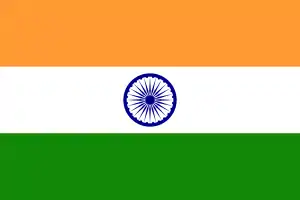1951 in India
| |||||
| Centuries: |
| ||||
|---|---|---|---|---|---|
| Decades: |
| ||||
| See also: | List of years in India Timeline of Indian history | ||||
Events in the year 1951 in the Republic of India.
Incumbents
- President of India – Rajendra Prasad[1]
- Prime Minister of India – Jawaharlal Nehru
- Chief Justice of India – H. J. Kania (until 6 Nov.), M. Patanjali Sastri (starting 6 Nov.)
Governors
Events
- 4-11 March, First Asian Games held in Delhi.
- 18 June – First Amendment of the Constitution of India says "state can make special provisions for advancement of any backward class"
- 5 November – Central Railway is formed by the merger of several government-owned railways.
- Western Railway is formed by merging smaller railways.
Arts and literature
- 16 December – Salar Jung Museum is opened to the public by the Prime Minister of India Jawaharlal Nehru.
Births
- 1 January – Nana Patekar, actor and filmmaker.
- 17 January – Bindu, actress.
- 1 March – Nitish Kumar, politician and Chief Minister of Bihar.
- 26 June - Pusapati Ashok Gajapathi Raju, politician and member of parliament from vizianagram.
- 10 July – Narayanasami Sathyamurthy, scientist.
- 11 July - Naramalli Sivaprasad, politician and member of parliament from Chittoor.
Deaths
- 15 February – Stephen Hector Taylor-Smith, rocket scientist (born 1891).
See also
- Bollywood films of 1951
References
- "Rajendra Prasad | Biography & Facts". Encyclopedia Britannica. Retrieved 15 September 2018.
This article is issued from Wikipedia. The text is licensed under Creative Commons - Attribution - Sharealike. Additional terms may apply for the media files.
